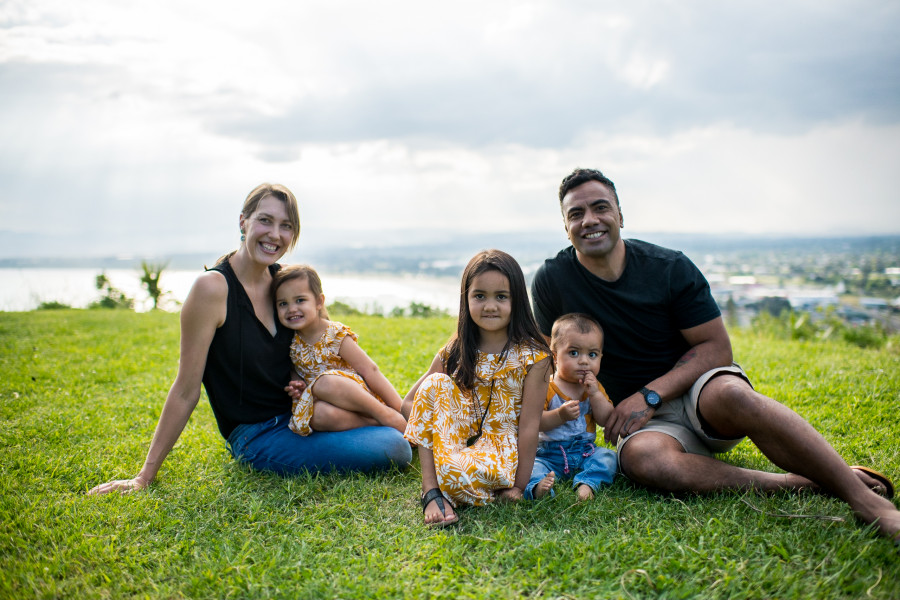Language fund supports couple's vision
Language fund supports couple's vision

Keeping their children in touch with their cultural heritage is of the utmost importance to Tongan/Samoan Oka Sanerivi and his English/Scottish wife Deborah.
As language and cultural identity are so important to the couple, they have been inspired to write a book Learning Samoan through bathtime (also available in Tongan), targeting anyone wanting to learn Pacific languages alongside their children.
“This book was written when Deborah was wanting to learn how to provide simple instructions in the Samoan language to our children,” Oka explains.
“The bilingual story is about a mother who is instructing her children through a bathing routine, in preparation for bed and sentences are structured in a way that helps identify the key body parts and how to address them in an appropriate way.”
Oka adds it is the couple’s hope that families, early learning centres and libraries will utilise their books as resources to promote Pacific languages in daily activities.
Based in Gisborne with their three children, Deborah is a primary school teacher, while Oka is a Physiotherapist with a special interest in Paediatrics.
The couple share different roles in their small business MA’AU, writing, designing and publishing Pacific language books.
Seeing their book come to fruition has been exciting and rewarding, although the journey has not been without its fair share of challenges.
“As new authors embarking on publishing our first book, we found the process to be a steep learning curve,” Oka says.
Finding appropriate funding they were eligible for was a challenge as their concept and MA’AU did not seem to meet the criteria for mainstream grants.
With the support and guidance of respected authors such as Sharon Holt and the infamous David Riley, Oka and Deborah have been able to source funding through the Ministry for Pacific Peoples Languages Innovation Fund (LIF) and complete their project.
The LIF was a pilot programme launched at the end of 2019 to support grassroots initiatives which increase awareness, celebrate, grow and inspire the daily use of Pacific languages in Aotearoa.
After its success, the Community Languages Fund was established, which supports projects targeted towards Pacific community groups and Pacific families; shares and passes on Pacific language knowledge; enables accessibility to language learning; increases the awareness and value of Pacific languages in Aotearoa; and helps increase and grow the number of speakers of Pacific languages.
Oka says without the funding MA’AU received from the LIF, he and Deborah would not have been able to turn their story concept into the books which families and early learning centres are now reading.
“We went through considerable effort in applying to several grants only to be turned down.
“The LIF enabled us to secure the services of our creative team and the initial printing of our books and we are grateful to MPP for the invaluable start-up support which has given us both the confidence and the means to achieve a dream of ours.”
Along with the challenges of publishing their first book, there have been many, many highlights, Oka adds.
“Seeing our ideas brought to life by our illustrator Chad Robertson and designer Jordan Foster is definitely a highlight as is receiving our books from the Printer.
“Processing our first order from one of our friends, and then the thrill of seeing multiple large orders from Pacific families we have never met before is another – these families are living in Aotearoa, Australia and even the United States.
“Lastly, receiving glowing feedback from parents who never thought they would be raising their children away from the islands and who are so excited to read a story to their children with pictures which reflect them and their language - reading these messages and emails have been deeply humbling.”
The authors have already written their next book concept which centres around the Pacific family and the child's significant role in their family.
“We aim to translate this book into Samoan, Tongan and Fijian initially and this will be the second instalment of what we hope to be a growing series.
“Deborah also hopes to keep improving her Samoan to be beyond that of our preschool-aged children.”
Visit MA’AU to order Learning Samoan through bathtime or Learning Tongan through bathtime.
